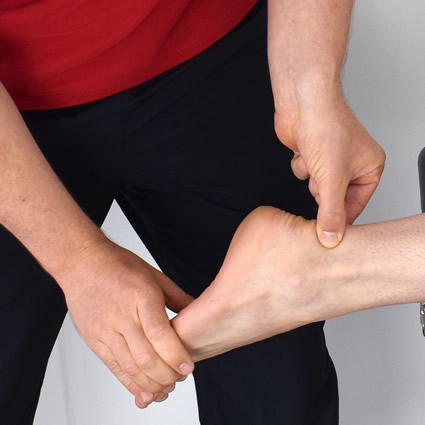Achilles Tendinitis Treatment in Croydon
Calf pain / Heel pain
 This painful condition can be debilitating, preventing normal ambulation and can detrimentally affect normal activities of daily living. Croydon chiropractors, physiotherapists and osteopaths at Croydon Sports Injury Clinic Ltd can help assess, diagnose and provide therapy for Heel pain and Achilles tendon injuries. Our chiropractors, physiotherapists and osteopaths combine alternative therapies like mobilisations of the foot joints with therapeutic ultrasound, interferential and TENS as examples. Other related foot conditions can include ankle ligamentous strain and plantar fasciitis.
This painful condition can be debilitating, preventing normal ambulation and can detrimentally affect normal activities of daily living. Croydon chiropractors, physiotherapists and osteopaths at Croydon Sports Injury Clinic Ltd can help assess, diagnose and provide therapy for Heel pain and Achilles tendon injuries. Our chiropractors, physiotherapists and osteopaths combine alternative therapies like mobilisations of the foot joints with therapeutic ultrasound, interferential and TENS as examples. Other related foot conditions can include ankle ligamentous strain and plantar fasciitis.
What is the achilles tendon?
Transmitting the forces of the large calf muscle group (gastrocnemius/soleus) from the lower leg to the foot, The achilles tendon inserts into the heel at the most posterior aspect of the calcaneus. The tendon is the strongest tendon in the body, it is used in every movement of the ankle joint and without it we couldn’t walk or plantar flex the foot.
Most injuries are caused by excessive and/or repetitive motion, often associated with poor foot biomechanics causing micro-trauma injury: Often, a recent increase in activity levels (such as more stair-climbing) or a change in footwear is reported by the patient. Repetitive jumping and running can predispose to developing an injury. It’s always recommended to consider seeing a podiatrist for a proper foot biomechanical assessment while at the clinic we can also give basic advice on removable orthotic inserts.
When the body is unable to keep up with the repair and re-strengthening needs, the tendon tissue can begin to fail and become symptomatic. If the tendonitis is not very painful (or when the pain is eliminated by medication), continued stress may potentially lead to complete failure, with a resulting acute tear. A common contributing cause of Achilles tendonitis is due to over-pronation of the foot. Over pronation produces a whipping action, or bowstring effect which can lead to micro-tears in the tendon, particularly in its medial aspect, which can also initiate an inflammatory response.
Calf and heel Pain caused by tendonitis is aggravated by activity, especially uphill running or stair-climbing, and it may be relieved somewhat by wearing higher-heeled shoes or boots.
As part of diagnosis, a firm tissue tightness can be felt over the area behind the ankle which may feel tender and painful. The thickening of the peri-tendon may also be accompanied by a clicking sound (crepitus) during plantar flexion and dorsiflexion of the foot.
At Croydon Sports Injury Clinic Ltd a variety of techniques can be applied to resolve the inflammatory response attributed with tendonitis. Inflammation of the tendon occurs in “a region of relative avascularity” which extends from 2 to 6 cm above the insertion into the heel (calcaneus) so therefore therapeutic ultrasound may help increase the blood flow to the area. As the (calcaneus) heel is a common site of rupture, this makes it especially important to ensure good blood flow during the healing of this condition. Although it is always recommended to inform your health physician or GP it is normally the case that anti-inflammatory strategies (such as NSAIDS drugs and corticosteroid injections) are not indicated and actually may interfere with tendon repair.
At Croydon Sports Injury Clinic we don’t just look at treating the symptoms, we assess the body as a whole right from the first chiropractic, physiotherapy or osteopathy assessment. When patients first come to see us we assess posture, looking at the gait cycle, how they walk, whether their heel strikes with proper support in the arch. Our team can provide advice and orthotics to help control foot rolling in inversion or eversion, this often helps correct problems further up the foot.
Book Your Appointment
For help in dealing with heel and calf pain call Croydon Sports Injury Clinic Ltd today.
CONTACT US

